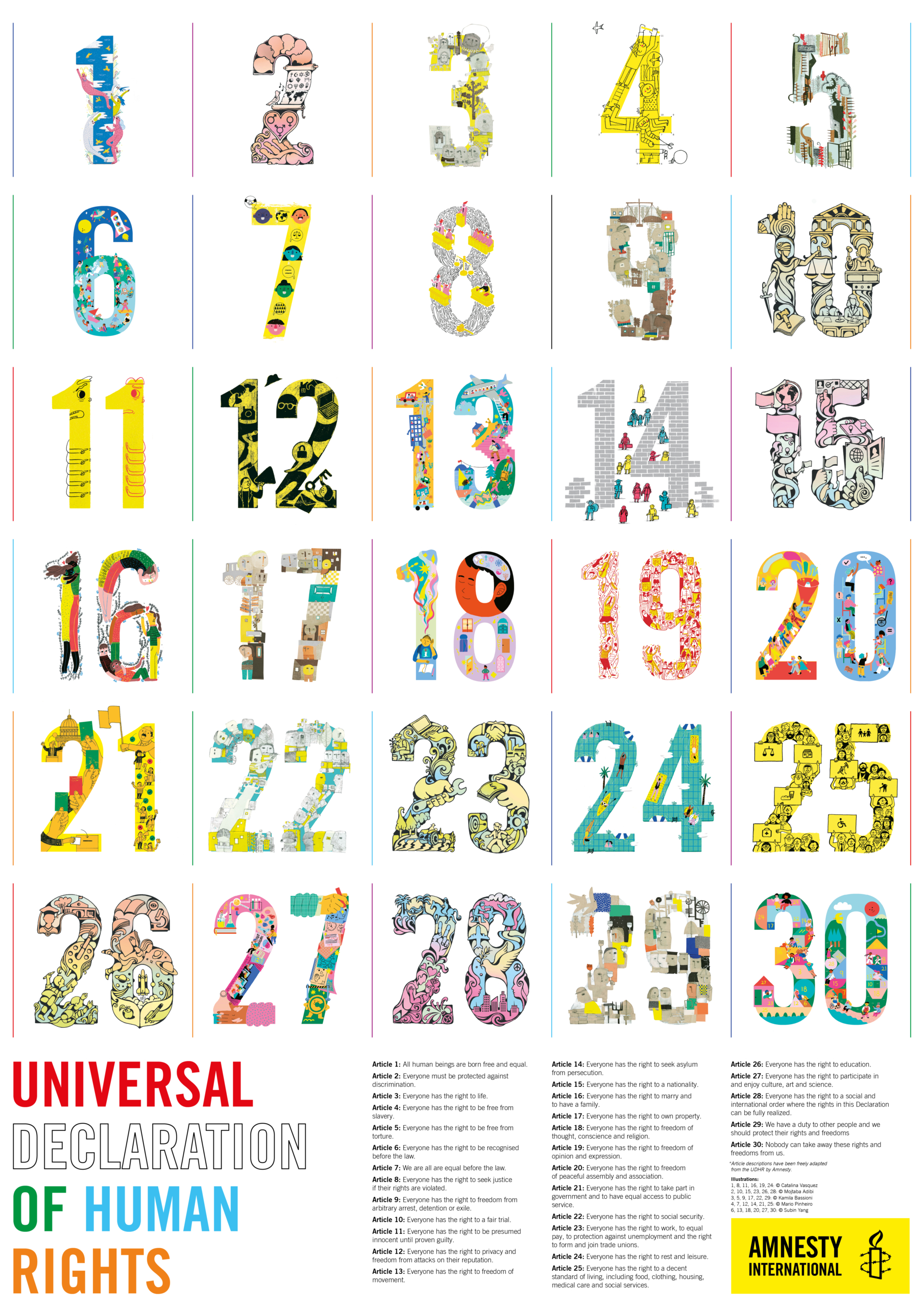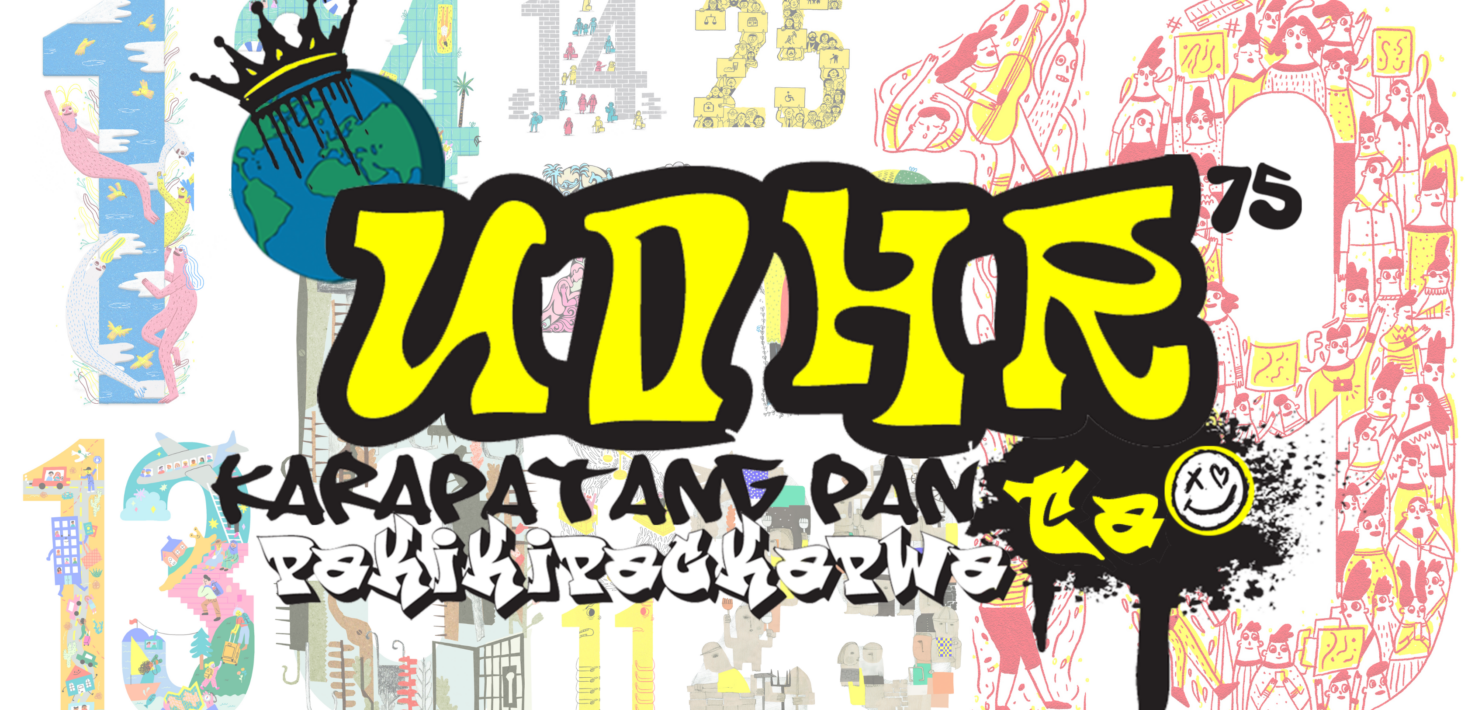WHAT IS THE UDHR AND WHY WAS IT CREATED?
The Universal Declaration of Human Rights (UDHR) is a document that acts like a global road map for freedom and equality – protecting the rights of every individual, everywhere. It was the first time countries agreed on the freedoms and rights that deserve universal protection in order for every individual to live their lives freely, equally and in dignity.
The UDHR was adopted by the newly established United Nations on 10 December 1948, in response to the “barbarous acts which […] outraged the conscience of mankind” during the Second World War. Its adoption recognized human rights to be the foundation for freedom, justice and peace.
Work on the UDHR began in 1946, with a drafting committee composed of representatives of a wide variety of countries, including the USA, Lebanon and China. The drafting committee was later enlarged to include representatives of Australia, Chile, France, the Soviet Union and the United Kingdom, allowing the document to benefit from contributions of states from all regions, and their diverse religious, political and cultural contexts. The UDHR was then discussed by all members of the UN Commission on Human Rights and finally adopted by the General Assembly in 1948.
The Declaration outlines 30 rights and freedoms that belong to all of us and that nobody can take away from us. The rights that were included continue to form the basis for international human rights law. Today, the Declaration remains a living document. It is the most translated document in the world.
WHAT IS IT DESIGNED TO DO?
The UDHR is a milestone document. For the first time, the world had a globally agreed document that marked out all humans as being free and equal, regardless of sex, colour, creed, religion or other characteristics.
The 30 rights and freedoms set out in the UDHR include the right to be free from torture, the right to freedom of expression, the right to education and the right to seek asylum. It includes civil and political rights, such as the rights to life, liberty and privacy. It also includes economic, social and cultural rights, such as the rights to social security, health and adequate housing.
WHAT IS THE FUTURE OF UDHR?
The UDHR legacy challenges us to go on the offensive. It demands that we resist the globalised, transnational and localised attacks against rights. But it also tells us this won’t be enough. It asks of us too that we disrupt the building of world orders that reproduce historical privileges and injustices, violate rights and silence defenders; and that we transform global governance by re-imagining, innovating, leading.
We can, we must – build bold, visionary leadership, institutions and systems – that can protect our planet, for future generations, and from all that torments us.
PREAMBLE
Whereas recognition of the inherent dignity and of the equal and inalienable rights of all members of the human family is the foundation of freedom, justice and peace in the world,
Whereas disregard and contempt for human rights have resulted in barbarous acts which have outraged the conscience of mankind, and the advent of a world in which human beings shall enjoy freedom of speech and belief and freedom from fear and want has been proclaimed as the highest aspiration of the common people,
Whereas it is essential, if man is not to be compelled to have recourse, as a last resort, to rebellion against tyranny and oppression, that human rights should be protected by the rule of law,
Whereas it is essential to promote the development of friendly relations between nations,
Whereas the peoples of the United Nations have in the Charter reaffirmed their faith in fundamental human rights, in the dignity and worth of the human person and in the equal rights of men and women and have determined to promote social progress and better standards of life in larger freedom,
Whereas Member States have pledged themselves to achieve, in cooperation with the United Nations, the promotion of universal respect for and observance of human rights and fundamental freedoms,
Whereas a common understanding of these rights and freedoms is of the greatest importance for the full realization of this pledge,

Now, therefore, The General Assembly proclaims This Universal Declaration of Human Rights as a common standard of achievement for all peoples and all nations, to the end that every individual and every organ of society, keeping this Declaration constantly in mind, shall strive by teaching and education to promote respect for these rights and freedoms and by progressive measures, national and international, to secure their universal and effective recognition and observance, both among the peoples of Member States themselves and among the peoples of territories under their jurisdiction.
HUMAN RIGHTS ARE UNIVERSAL, INDIVISIBLE AND INTERDEPENDENT
All human rights are equally important, and all governments must treat human rights in a fair and equal manner, on the same footing and with the same emphasis. All states have a duty, regardless of their political, economic and cultural systems, to promote and protect all human rights for everyone without discrimination.
So no matter what distinctions people have, there is one basic principle that underlies all the rights outlined in the UDHR: that every human being has the same inalienable rights. This means human rights are the same for every man, woman and child across the world, no matter what their circumstances.
There can be no distinction of any kind: including race, colour, sex, sexual orientation or gender identity, language, religion, political or any other opinion, national or social origin, of fortune, of birth or any other situation. Universal means everyone, everywhere.
The UDHR also shows us that human rights are interdependent and indivisible. All of the 30 articles in the Declaration are equally important. Nobody can decide that some are more important than others. Taking away one right has a negative impact on all the other rights.


